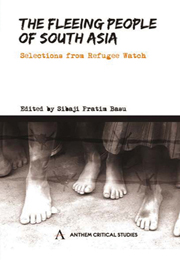Book contents
- Frontmatter
- Contents
- Acronyms and Abbreviations
- Foreword by Ranabir Samaddar
- Preface
- ETHICAL ISSUES
- LAWS
- SOUTH ASIA
- Introduction
- Refugees in South Asia: An Overview
- Internally Displaced Persons in Sri Lanka
- A Matter of Ethnicity
- Scrutinizing the Land Resettlement Scheme in Bhutan
- The Taliban Shelter Seekers or Refugee Warriors?
- Afghan Refugees head for Tajikistan, holed up in the Pamir Mountains
- Impact of International Jurisdiction on Afghan Refugee Rights
- Development Induced Displacement in Pakistan
- On the Trail of Burma's Internal Refugees
- Assault on Minorities in Bangladesh: An Analysis
- Neoliberal Globalization and Women's Experiences of Forced Migrations in Asia
- Who Went Where and How are They Doing? Pakistanis and Indians Outside South Asia
- INDIA
- GENDER
- INTERVIEW/CORRESPONDENCE
- REPRESENTATIONS
- Index
Assault on Minorities in Bangladesh: An Analysis
from SOUTH ASIA
Published online by Cambridge University Press: 05 March 2012
- Frontmatter
- Contents
- Acronyms and Abbreviations
- Foreword by Ranabir Samaddar
- Preface
- ETHICAL ISSUES
- LAWS
- SOUTH ASIA
- Introduction
- Refugees in South Asia: An Overview
- Internally Displaced Persons in Sri Lanka
- A Matter of Ethnicity
- Scrutinizing the Land Resettlement Scheme in Bhutan
- The Taliban Shelter Seekers or Refugee Warriors?
- Afghan Refugees head for Tajikistan, holed up in the Pamir Mountains
- Impact of International Jurisdiction on Afghan Refugee Rights
- Development Induced Displacement in Pakistan
- On the Trail of Burma's Internal Refugees
- Assault on Minorities in Bangladesh: An Analysis
- Neoliberal Globalization and Women's Experiences of Forced Migrations in Asia
- Who Went Where and How are They Doing? Pakistanis and Indians Outside South Asia
- INDIA
- GENDER
- INTERVIEW/CORRESPONDENCE
- REPRESENTATIONS
- Index
Summary
The post-election violence in Bangladesh (2001) specifically targeted the Hindu minority population though in a broader frame it also encompassed Awami League (AL) supporters and other progressive forces in the rural areas. The violence has largely been known to be initiated by Bangladesh National Party (BNP) supporters in various localities. The backlash after the elections was systematic and severe. Bangladeshi press has reported that attackers have entered Hindu homes, beaten family members and looted their property. Rape and abduction of women too were reported. Though these attacks were condemned by national as well as international institutions, a silencing process has also been at work both as a result of terrorising policies of the ruling party as well as the self-censoring practices of the liberal civil society. It is the roots of this silencing process, which I wish to highlight in this article, because it unpacks questions of class hegemony in the current Bangladesh state. I therefore locate the question of religious minorities in Bangladesh in the broader frame of the class discourse.
CLASS FORMATION THROUGH EXTORTION: A BACKGROUND
In the aftermath of independence, it was thought by some scholars that Bangladesh had a ruling class but it was not a hegemonic one. The reason behind this proposition was that the power base of the then AL who had an absolute majority in parliament, was predominantly petit bourgeois and the rural rich, who did not have enough control over the military–bureaucratic oligarchy traditionally controlling the ‘overdeveloped’ Pakistan state.
- Type
- Chapter
- Information
- The Fleeing People of South AsiaSelections from Refugee Watch, pp. 190 - 195Publisher: Anthem PressPrint publication year: 2009



